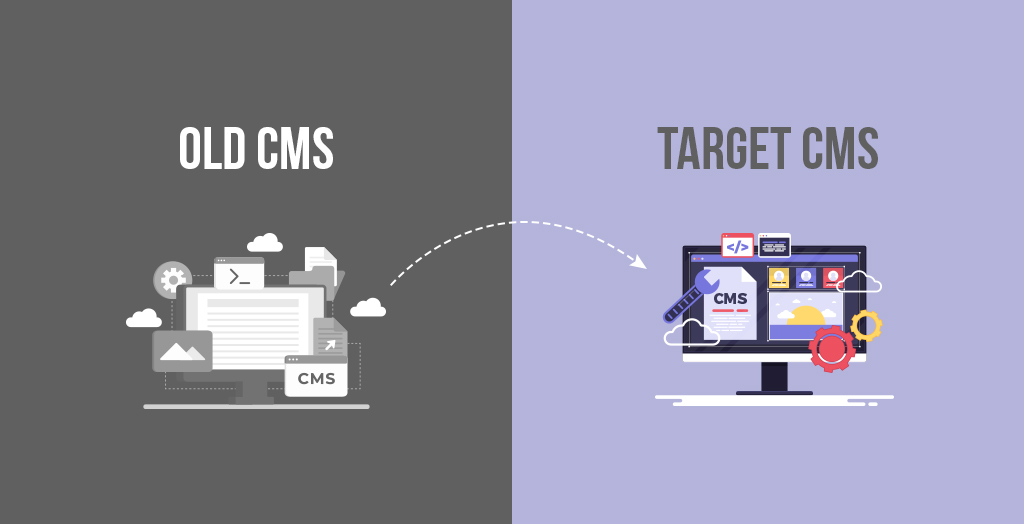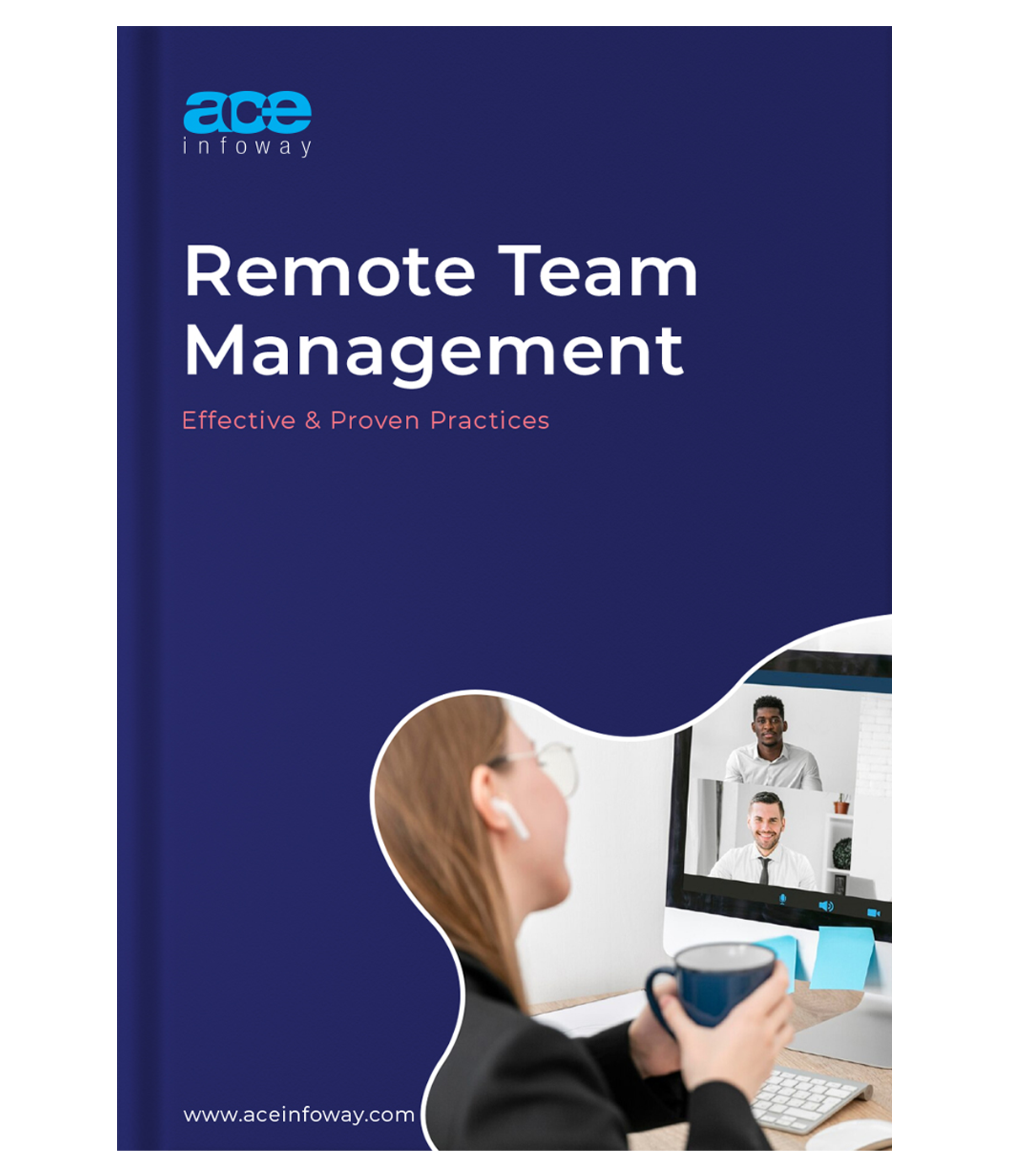Table of Contents
Do you know, 83% of data migration projects either fail or exceed the budget?- Research Gate
CMS migration is a gigantic and critical process for any business, especially when you have been using your legacy CMS for years and have settled your hands on it.
But, if you won’t change and innovate, how will you grow?
The same goes for your CMS. With the advancement in technology, numerous CMSs have been introduced lately, among which Wix, Squarespace, Shopify, WordPress, and Drupal are the most mainstream ones on the lookout, owing to their contribution in boosting the business profit.
Considering the fact, many businesses have already migrated their legacy CMS to some latest and better-performing ones, and they are reaping huge benefits as well. If you have landed here, you might have also been wondering about the CMS migration process and several questions might have been making rounds in your mind, like-
- Whether you need to migrate your CMS?/ When to migrate your CMS?
- What are the challenges associated with the migration process?
- How to migrate your CMS?
To help you with the same, we have addressed the entirety of your queries in this article, creating a clear perspective.
When to Migrate your CMS?
- Facing excessive server downtime
- Website speed slowing down
- The website is unable to handle large traffic volumes and sudden traffic spikes
- Your website is unable to integrate with advanced tools
- The website has limited features
- Website is vulnerable
- The existing CMS vendor does not extend support when needed
- You want to redesign your website
- You want to upgrade your CMS
Note: If your company is facing one, or all of these issues, you should quickly start migrating your CMS to a superior solution.
Challenges Associated with the Migration Process
- Accurate data mapping
- Search engine optimization
- Page ranking
- Broken links
- Data format support
- Data handling
- Website Security
- Probability of data loss
- Website performance
- Advanced technical skills
Cheatsheet for CMS Migration to Mitigate the Migration Risks
To make your migration process successful, you should leave no scope for risks and failures. To do the same, here is a cheatsheet to consider through all the migration processes- Pre-Migration, During the Migration, and Post-Migration Process.
Checklist to Consider Before the CMS Migration Process
-
Build your Team
The premier thing you ought to recollect prior to moving your CMS is building a competent team. Your team should have experience and knowledge in the field, to conduct a smooth migration process.
-
Set up the Data for Mapping
CMS migration doesn’t mean just aimlessly moving the whole information, without inspecting its significance and relevance. Distinguish the significance and necessity of the information that you are moving. Refine the information completely, after which you can start with the data mapping. Moving the irrelevant data just adds to your workload unnecessarily, leading to a waste of time.
-
Create a Powerful and Realistic Plan
Failing to plan is planning to fail. Hence, instead of starting the migration process abruptly, you should have a deliberate, comprehensive, and detailed plan to work upon. Make sure to consider all the factors related to the process, ranging from the data to implementation to deployment.
-
Get Every Vital Tool
Acquire all the tools that are necessary for the migration process. However, before that make sure to find out the parts of your CMS migration that you can automate and the ones that you need to do manually. Once you have decided the data for which you are automating the migration process, find out the appropriate tool for the same.
Also do not forget to check the tools before actually deploying them into your system. To test the tools, migrate a few data and then check the state of the resultant data i.e. whether it is in the desired form or the data has been lost or modified.
-
Assess Security Factors
Check the security factors for the migration process mixture of the compliance regulation of the existing CMS matches with the new CMS migrating to. Make sure all of your stakeholders are also informed about the same.
-
Prepare a Redirection Map for your CMS Migration Process
Prepare a direction map to keep track of the redirections of your CMS. This map helps you to track the performance of your migration process after the CRM goes live.
-
Analyze Legacy & Target CMS Systems
Check the compatibility of your existing data with the new CMS system before you start with the migration process. Make sure that the fields and data that were supported by your existing system, are supported by the new CMS system as well. Check whether the new CMS system is customizable or not, in case you are using the customizable feed.
-
Hire the Experts
Migrating the CMS involves humongous data handling, losing any of which can be a huge loss for an organization and business. Hence, the most feasible way to deal with it is to hire reliable experts for the same. The experts will migrate your CMS efficiently and handle any sort of accidents or mishaps during the process.
-
Backup Your Data
One of the extremely important parts of the migration process is data backup. Back up your data before starting the migration process as it prevents you from any mishappening with your data. Data backup gives you the option to roll back in case of any system failure or occurrence of error.
Read More:
Checklist to Consider during CMS Migration Process
-
Pay Attention To Customized Fields
While migrating your CMS, do take care of the customized field. Jot down the fields you want to customize in the new system. Have clarity about the type of data and field you are expecting in the new system. When you are migrating, do pay special attention to the field that you are supposed to customize.
-
Check the Internal Links
A CMS consists of numerous links that work for your business. Hence, during the migration process, you should check the internal links present within your CMS. Make sure all of the internal links present in the CMS are functioning as per the expectations. None of them are broken or falsely redirected.
Checking the internal link before making your CMS live improves the efficiency of the CMS. You can use numerous tools for auditing the internal links of your CMS such as Screaming Frog, Apify, and DeepCrawl.
-
Monitor the Google Search Console and Analytics
Your legacy CMS was recognized by the Google search engine and was also performing well. Now that you are migrating to a new CMS, you need to keep an eye on the Google Console as well. Review your Google search console to check the performance of your CMS, based on how Google Console is processing it.
The analysis proves to be extremely beneficial, as in case an error occurs, for example, it is redirecting to some other page, at least you will know it in advance. Based on this, you can take the necessary actions.
-
Migrate the Attachments
Along with migrating the internal links and the other data, do not forget about the attachments present in your CMS. The best approach to migrate all the attachments is to store them to a centralized location, whether local folder or cloud storage, so that the attachments are easily accessible.
-
Cross-check the Redirections against the Map
Once you have launched your new CMS it’s time to check the integrity and correctness of the redirections of your CMS. Crawl all the URLs in your new CMS against the redirection map that you are prepared for the links. Make sure all the internal links are redirected to the right page.
-
Analyze Variances in Data Architecture
Analyze and jot down the variations in your data architecture before starting the CMS migration process. To do this you can do a trial migration. Migrate a sample of data and analyze the variance between the existing and the target CMS. Prepare the map of the variances, based on which you can track the integrity of the data and make the necessary changes where required.
Checklist to Consider Post CMS Migration Process
-
Check Page Ranking
Once you have launched your CMS, it’s time to check its performance on the Google search engine as well. Find out how well your CMS is performing? What is the rank of your new CMS in the search engines?
It gives you an insight into the performance of your web pages and the website. What are the keywords that were performing well for your legacy website but now experiencing a downfall? Also, you get an idea that about the presence of some unexpected behavior of the pages and its cause. Whether it’s having a broken link or lack of directions or irrelevant redirection.
-
Check the Live Redirections
Keep track of the performance of the redirections of your website. For this, you can review the Google search console. If some of the redirections are not performing well, you will be able to track the exact URL of the same and make the improvements or changes in advance, mitigating the possibility of future errors.
-
Decommission your Old CMS
Once you have analyzed your new CMS for quite some time now and you have the confidence that is working correctly and efficiently and you have also aligned all of the pre-existing tasks of the legacy cms to the new CMS, so the existing CMS can now be shut down.
-
Train Your End-Users
Business is all about the customer and users. So, any changes to the website, product, or services should be in the knowledge of the customer user. So, after you have migrated to the new CMS, do not forget to inform your user about the same. Also, provide the necessary study material and guidance to the user to help them understand the CMS better and use them easily.
The Bottom Line
CMS migration, being accompanied by numerous risks, is a critical endeavor for a business, which needs to be carefully done. Hence, before starting with the migration process, you should know the areas which are vulnerable to risk and the ways to handle them.
By now you might have become well-versed about the same. Use the checklists provided in the article to navigate through all the phases of migration. However, if you are still facing issues, seek assistance from the experts. With the right team, tools, and technology, your CMS migration process will not only become simpler but also successful.


























Leave A Comment